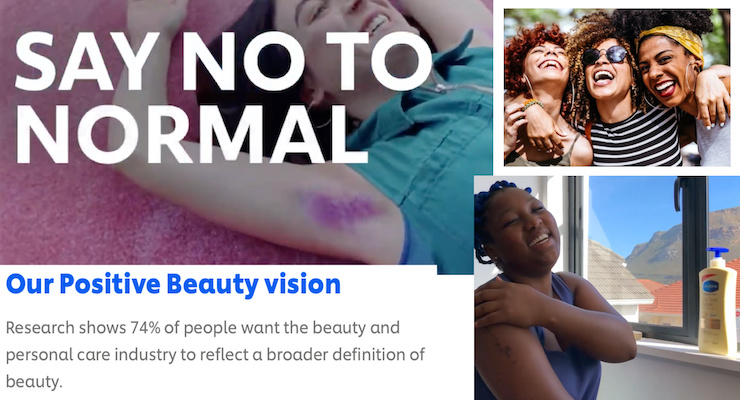Marie Redding, Senior Editor03.11.21
Fitting for Women's Month, Unilever has announced a new strategy—Positive Beauty—representing "a more all-inclusive vision."
The first step Unilever is taking as part of this new strategy is to remove the word "normal" from all its beauty packaging and ad campaigns. Unilever's most popular brands include Dove, Axe, Vaseline, and Sunsilk.
In addition to removing the word ‘normal’, Unilever states:
"We will not digitally alter a person’s body shape, size, proportion or skin color in its brand advertising, and will increase the number of advertisements portraying people from diverse groups who are under-represented."
Where is the word 'normal' used? On shampoo, for example, when it says it is for "normal to dry hair." This isn't the first time that Unilever changed its packaging—last July, it removed the words fair, light, and white from its Fair & Lovely brand, now called Glow & Lovely, after a petition by consumers.
Sunny Jain, President Beauty & Personal Care, comments:
"With one billion people using our beauty and personal care products every day, and even more seeing our advertising, our brands have the power to make a real difference to people’s lives. As part of this, we are committed to tackling harmful norms and stereotypes and shaping a broader, far more inclusive definition of beauty."
Why? Consumers Say 'Normal' Has a Negative Tone
Unilever commissioned a 10,000 person study across nine countries to research consumer's experiences of the beauty industry.
The study found that using ‘normal’ to describe hair or skin makes most people feel excluded.
Seven in ten people agreed that using the word 'normal' on product packaging and advertising has a negative impact.
And for younger people, ages 18-35, this rises to eight in ten.
The survey also found:
- More than half of people (56%) think that the beauty and personal care industry can make people feel excluded.
- People want to see the beauty and personal care industry focusing more on making people feel better than just looking better (74%).
- More than half of people (52%) say they now pay more attention to a company’s stance on societal issues before buying products.
Sarah Degnan Kambou, president of the International Center for Research on Women, comments,
“Every day, we see and hear messages about how to ‘fit in’, how to be included in very narrow definitions of what is ‘normal’. To champion equity, we need to challenge these restrictive ‘norms’ and create societies and communities that celebrate diversity – and the unique qualities and ideas that each person brings. Beauty is no exception. We look forward to seeing Unilever advance these commitments and hold themselves to the high standards they have set out before them.”
More Changes Ahead—For Animals, Our Planet & More
Unilever's Positive Beauty strategy and vision will also help to drive changes in how products are formulated so that they "do more good for both people and the planet," the company states.The new strategy aims to "do more good, not just less harm, for people and the planet," according to a statement.
Unilever will:
- help end discrimination in beauty, champion inclusion, and drive gender equality
- protect and regenerate 1.5 million hectares of land, forests, and oceans by 2030
- support a global ban on animal testing for cosmetics by 2023
Take a look at the video below from Unilver's YouTube channel.
And if you haven't seen how Unilever's team transformed the look of Dove deodorant, making it as stylish as an iPhone and refillable—take a look at: Dove's Refillable Deodorant Is Made To Last a Lifetime




























